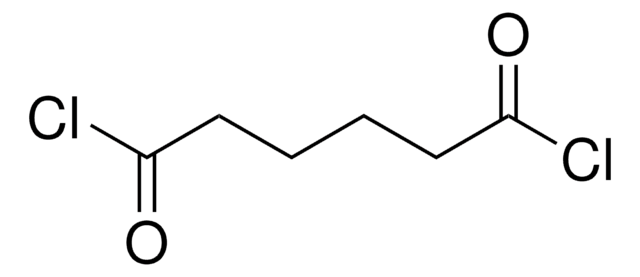79229
N-Boc-1,6-hexanediamine
≥98.0% (NT)
Synonym(s):
N-Boc-1,6-diaminohexane, tert-Butyl-N-(6-aminohexyl)carbamate
About This Item
Recommended Products
Quality Level
Assay
≥98.0% (NT)
form
liquid
reaction suitability
reagent type: cross-linking reagent
refractive index
n20/D 1.462
density
0.965 g/mL at 20 °C (lit.)
functional group
Boc
amine
SMILES string
NCCCCCCNC(OC(C)(C)C)=O
InChI
1S/C11H24N2O2/c1-11(2,3)15-10(14)13-9-7-5-4-6-8-12/h4-9,12H2,1-3H3,(H,13,14)
InChI key
RVZPDKXEHIRFPM-UHFFFAOYSA-N
Looking for similar products? Visit Product Comparison Guide
Application
- Biodegradable poly(disulfide amine)s for gene delivery.
- A multifunctional dendrimer for theranostics.
- Polyamide platinum anti-cancer complexes designed to target cancer specific DNA sequences.
- Self-assembled monolayers (SAMs) that resist adsorption of proteins.
- [N-(6-(4-Hydroxy-6-isopropylamino-1,3,5-triazin-2-ylamino)hexyl)-5-hydroxy-1,4-naphthoquinone-3-propionamide] (JUG-HATZ), which can be used in designing electrochemical immunosensors.
Signal Word
Danger
Hazard Statements
Precautionary Statements
Hazard Classifications
Eye Dam. 1 - Skin Corr. 1B
Storage Class Code
8A - Combustible corrosive hazardous materials
WGK
WGK 3
Flash Point(F)
257.0 °F - closed cup
Flash Point(C)
125 °C - closed cup
Personal Protective Equipment
Choose from one of the most recent versions:
Already Own This Product?
Find documentation for the products that you have recently purchased in the Document Library.
Customers Also Viewed
Our team of scientists has experience in all areas of research including Life Science, Material Science, Chemical Synthesis, Chromatography, Analytical and many others.
Contact Technical Service











